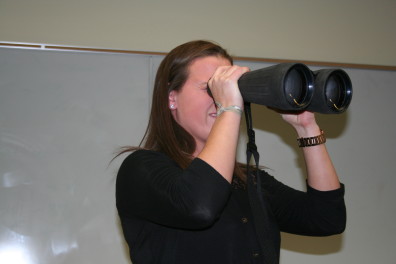
Though gloves kept their hands clean, future accounting professionals discovered digging through trash is an important technique for investigating “dirty money” and other forms of tax fraud during a mock forensic accounting exercise known as the Adrian Project.
The national teaching exercise conducted by U.S. Internal Revenue Service agents helps students learn about potential accounting careers in law enforcement.
Retired IRS special agent Keith Nelson, who teaches forensic accounting in the Carson College of Business, arranged for the special agents from the IRS Criminal Investigation’s Seattle Field Office to conduct the exercise on the Washington State University Pullman and Vancouver campuses in November.
A day in the life of an IRS agent
“Looking at a reporting document and finding what is wrong is very interesting to me,” said Kellie Shinstrom, who is considering a career as a criminal investigator.
She and 24 other Pullman master of accounting students and four WSU Police Department student interns were sworn in as honorary special agents for the day. Five Vancouver students and two IRS special agents participated via live video streaming at the conclusion of the exercise.
The first exercise was a tax fraud scenario, where an ice cream shop owner was accused of cheating on taxes. Visiting agents acted as the informant and shop owner so students could practice effective questioning and surveillance methods.

“Think about what resources you can leverage, and always get the name and phone number of the informant,” advised Ryan Thompson, IRS public information officer. “Doing a drive-by, monitoring a house for activity and going through trash, if it is outside of a building, are all acceptable methods of obtaining evidence to prove probable cause.”
The art of the arrest
Next, Thompson led a smaller group of students in a mock undercover exercise, where they were fitted with a wire before interviewing a suspect. Packing mock “heat” but real bulletproof vests, the students arrested and handcuffed the suspect.
While the scene was all in good fun, Thompson coached students on critical safety measures while making an arrest and the types of special warrants necessary to obtain particular evidence within a home, such as computers and files.
The agents stressed the importance of good writing skills required for affidavits. Some affidavits are well over 150 pages, explained special agent Mike Payne: “Then you have to write a report summarizing the results.”

Special agent requirements include: under age 37 unless a veteran; bachelor’s degree; minimum 2.0 GPA; minimal accounting training; reasonable fitness level and successfully passing a tax audit and criminal background check.
Once hired, agents are paid to work out three hours a week, drive a company car, have great benefits, and must retire at age 57.
Anyone interested in a law enforcement career with the IRS or other government agency can find more information at usajobs.gov.
Other IRS employees who facilitated the Adrian Project at WSU included Tyler Andrews, Adam Gigler, Daryl Kaiser, Chris Martin, Carrie Nordyke (’01 accounting), Anne Rueter (’86 accounting), Abe Smith and Jason Smith.
Preparing for an accounting career
In addition to the forensic accounting exercises, WSU’s Nelson and business law professor Kim Houser coordinated with the University of Idaho Law School so accounting students could showcase their investigative and expert testimony skills in a free, public mock arbitration exercise.
The case involved the Tallahassee Bean Counters (TBC), a fictitious minor league baseball team whose employees were accused of theft. Idaho law professor Maureen Laflin’s students studying negotiation and alternative dispute resolution cross-examined the WSU forensic accounting student experts, who investigated the alleged theft and testified in the model courtroom.
“Part of the exercise was to point out errors and to help everyone understand the importance of note taking/memos, conducting thorough investigations and communicating clearly,” said Laflin. “Coming to a conclusion is one thing; proving it in court is another.
“Students from both our institutions gained critical, real-world experience from this exercise,” she said.
Learn more about the Carson College accounting program.
